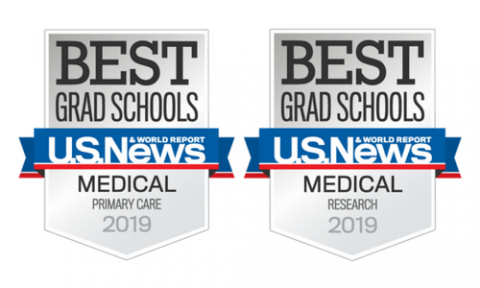Case Western Reserve University School of Medicine is ranked #25 of all research-oriented medical schools in the nation and #1 in Ohio, according to the annual ranking of graduate schools released today by U.S. News & World Report.
“This recognition is testimony to the outstanding quality of our faculty and students,” said Pamela B. Davis, MD, PhD, dean of Case Western Reserve University School of Medicine and the university’s senior vice president for medical affairs. “Our placement among the top 25 medical schools in the United States and as number one in Ohio reflects our commitment to excellence in medical education and research.”
The rankings are based on two general factors: 1) statistical criteria such as amount of research funding obtained by faculty members, faculty-to-student ratios, and measurable qualifications of admitted students, such as Medical College Admission Test scores; and 2) peer assessments from medical and osteopathic school deans nationally, deans of academic affairs, and heads of internal medicine or directors of admissions.
“We are proud that the excellence of our academic program continues to attract students who are among the finest in the nation,” added Dean Davis. “As we celebrate our school’s 175th anniversary year, we’re excited about our future contributions in research, education and community engagement.”
“Throughout our history we have been a driving force in medical education and research, producing outstanding physicians and investigators,” said Vice Dean for Medical Education Patricia A. Thomas, MD, FACP. Among the school’s innovations in medical education is the Western Reserve 2 curriculum, which unites the disciplines of public health and medicine into a single program of study. Another hallmark is the school’s emphasis on interprofessional education, in which medical, dental, nursing, and social work students learn together and from each other. “Most recently, we have updated our human anatomy curriculum, which incorporates time-tested learning approaches with today’s most inventive instructional tools, including hologram-based, 3D dissection,” added Dean Thomas.
In 2017 the school’s research funding from the National Institutes of Health, the primary source of support for biomedical research in the United States, exceeded $322 million -- an increase of 7 percent over 2016.
“In addition to our education and research accomplishments we’re proud of our medical school’s commitment to improving the health and well being of its community members,” added Dean Davis. “On that score, we’re very proud of the many ways we introduce our students to the importance of community involvement, including providing first-year students with clinical experiences that increase their understanding of the challenges involved in delivering care in a community setting.”
DOWNLOAD VIDEO - w/ background music for website
DOWNLOAD VIDEO - w/out background music for VO/SOT
Pamela B. Davis, MD, PhD
Dean, Case Western Reserve University School of Medicine
Senior VP, Medical Affairs, Case Western Reserve University
###
For more information about Case Western Reserve University School of Medicine, please visit case.edu/medicine.
Media Contact(s):
Ansley Gogol
Associate Communications Specialist
Case Western Reserve University
School of Medicine
Office: 216-368-4452
Ansley.Gogol@case.edu


